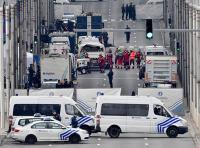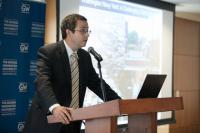-
Turkey deliberately “unleashing” ISIS terrorists into Europe: King Abdullah
King Abdullah of Jordan asserted that Turkey is exporting ISIS-linked terrorists to Europe. The king made the remarks in a meeting with members of Congress, in which he said that Islamist militants were being “manufactured in Turkey” and “unleashed” into Europe. He also used the briefing with lawmakers, which was held after the king’s meeting with President Barack Obama was cancelled, to remind the American politicians of Turkey’s complicity in buying ISIS oil.
-
-
U.K. exit from the EU would weaken the West in the war on terror: David Petraeus
General David Petraeus, the former director of the CIA and commander of the U.S. Central Command, warned on Sunday that Britain’s exit from the EU would weaken the West in the war on terror. Petraeus, writing in the Sunday Telegraph, said that Britain leaving the EU would “deal a significant blow to [it’s] strength and resilience at exactly the moment when the West is under attack from multiple directions.”
-
-
ISIS second-in-command killed by U.S. Special Forces in Syria
ISIS second-in-command Abd al-Rahman Mustafa al-Qaduli, aka Haji Imam, was killed by U.S. Special Forces operating inside Syria. This is the second time this month that a top leader of ISIS is killed by U.S. forces. ISIS “minister of war,” and the third most senior ISIS leader after Abu Bakr al-Baghdadi and the now-dead al-Qaduliin, died in a hospital two weeks ago after being seriously injured in a U.S. airstrike.
-
-
Worries in Belgium over ISIS dirty-bomb plot

Belgian security authorities say that it appears that ISIS-linked terrorists in the country have been planning to build a dirty nuclear bomb for use in a future terrorist attack. Growing concerns over security at nuclear plants have led to the revocation of security passes of eleven workers. A senior Belgian nuclear official was also secretly monitored by individuals linked to the 13 November Paris attacks.
-
-
Brussels suicide bombers were in U.S. terror suspects database

U.S. security agencies had the names of the two suicide bombers who attacked Brussels airport in their databases as potential terror threats. The revelation would raise even more questions about the competence and preparedness of the Belgian security authorities, which described the men merely as petty criminals who were not on the radar od the Belgian security counterterrorism agencies. The revelations also raise questions about the scope and quality of intelligence information sharing among Western countries.
-
-
Terrorists have been targeting transportation hubs for decades

More than 7,400 terrorist attacks worldwide between 1970 and 2014 targeted some form of transportation, including airports and aircraft, representing 5.3 percent of all terrorist attacks. More than 460 targets of terrorist attacks between 1970 and 2014 were airports, representing 6.4 percent of all transportation targets. More than 130 targets of terrorist attacks between 1970 and 2014 were subway systems, representing 1.9 percent of all attacks on transportation targets.
-
-
ISIS obtaining nuclear weapons “obviously a concern”: British defense secretary

British defense secretary Michael Fallon said the prospect of ISIS or another terror group with the “technical know-how” obtaining nuclear weapons is “obviously a concern.” Fallon said it was important to ensure that terror groups could not “get their hands on nuclear weapons” and said the United Kingdom was doing its part by maintaining strict export controls on the necessary technology.
-
-
U.K. could lose access to terrorism, crime databases if it leaves the EU: Europol

Rob Wainwright, the director of the EU’s police agency Europol, said that if Britain left the EU, it could lose access to important databases of terror and criminal suspects needed to fight ISIS. Wainwright said databases provided “daily” benefit to UK police in protecting borders. Leaving the EU would put intelligence cooperation in danger, he said.
-
-
Danish government considering plans to strip radical imams of citizenship
Denmark’s government is considering a proposal by an anti-immigration party to strip imams who preach ideas contrary to the Danish constitution of their citizenship. The proposal is part of an effort to expel outspoken radical imam Abu Bilal Ismail. Ismail is a leading imam at the Grimhoj mosque in the city of Aarhus, has openly called for the killing of Jews, and also the stoning of adulterous women and the killing of apostates.
-
-
The bitter fruits of alienation: Belgium’s struggle is the problem of our age
It is tempting to see the current waves of terrorism as the result of the sudden invasion of militant Islam. But in many respects the origins of the current violence remain just as local as the previous manifestations of terrorism in Western Europe – for example, the IRA or ETA. The sources of the current terrorist violence lie in the willingness of young men of immigrant populations to turn the quasi-criminal expertise learned in their formerly marginal lives to more political and violent ends. The problems that we confront today are not going to go away soon. The current terrorism is so amorphous and so shallow in its political affiliations that it may fade away, as those drawn towards it today are attracted to the more immediate opportunities of tomorrow. But it is more likely that the breaking up, arrest, and imprisonment of particular networks of individuals will simply be replaced by other such groups, who will similarly find in particular languages of Islam the vehicle for their angers and their emotional rejection of wider society. Putting back together Europe’s social contract might take longer than any of us would like to think.
-
-
Religious and civic rights were important components of a “Muslim nation”
Prophet Muhammad believed that freedom of religion and civic rights were important components of a “Muslim nation,” according to an analysis of the prophet’s covenants with Christians. The researcher argues that the covenants can be used to develop a stronger democratic partnership between Muslims and Christians in the Islamic world and elsewhere.
-
-
Massive U.S. attack in Yemen kills “dozens” of AQAP terrorists

A massive U.S. airstrike on a terrorist training camp in Yemen has killed dozens of terrorists belonging to al-Qaida in the Arabian Peninsula (AQAP). This is the second such attack in as many weeks. Military analysts note that the two strikes, in which more than 200 terrorists have been killed, signal a different, if unstated, approach by the Pentagon. Until recently, U.S. strikes on terrorist facilities killed relatively few terrorists.
-
-
Islamist militants planning “near-term attacks throughout Europe”: U.S.
The State Department has issued a warning to Americans planning travel to Europe, saying that Islamist terror groups are planning more attacks throughout the continent. In a warning unusual in its scale, the State Department said people should exercise vigilance when in public places or when using mass transportation.
-
-
Brussels attacks: a throwback to pre-9/11 terrorism
The terrible scenes in Brussels following a terrorist attack now claimed by Islamic State are a reminder of just how vulnerable airports can be. The most likely and realistic response is increasing security presence around airports with a greater number of random checks. There is no foolproof solution to this security issue, though, and that’s something governments are going to have to admit. Terrorists have the ability radically to disrupt transportation systems, potentially causing loss of life and economic damage in the process, and there is little that can be done to stop them. For some time, terrorists pursued the much more difficult task of attacking aircraft while largely ignoring easier targets. The attack in Brussels shows the reality of renewed efforts against “soft targets” with the potential to bring about chaos to transportation systems.
-
-
Brussels attacks: how radicalization happens and who is at risk

As they recover from the shock of the attacks in Brussels, people are asking why this happens, and who the people carrying out these suicide missions are. That such attacks could be launched from inside a European country once again calls attention to a serious crisis: the radicalization of citizens outside the Middle East by extremist groups. Can we expect ever more people around the world to be radicalized to join ISIS? The outlook is mixed. Despite the successes of its recruitment and radicalization campaign since 2011, recent media reports show that IS is struggling to integrate different groups of foreign fighters into its combat forces in the Middle East and North Africa, raising the prospect that competing loyalties could fracture the group and undermine its ability to project an appealing recruitment message. As far as the fight against IS recruitment goes, this is a ray of hope. But there’s plenty of bad news too.
-
More headlines
The long view
Preventing Another 'Jan. 6' Starts by Changing How Elections Are Certified, Experts Say
The 2024 presidential election may be a rematch between President Joe Biden and former President Donald Trump, but preventing a repeat of Jan. 6, 2021 — when false claims of a stolen election promoted by Donald Trump and his allies led to an insurrection at the U.S. Capitol —will be top of mind this election year. Research finds broad support among public for nonpartisan certification commissions.
States Rush to Combat AI Threat to Elections
This year’s presidential election will be the first since generative AI became widely available. That’s raising fears that millions of voters could be deceived by a barrage of political deepfakes. Congress has done little to address the issue, but states are moving aggressively to respond — though questions remain about how effective any new measures to combat AI-created disinformation will be.
Chinese Government Hackers Targeted Critics of China, U.S. Businesses and Politicians
An indictment was unsealed Monday charging seven nationals of the People’s Republic of China (PRC) with conspiracy to commit computer intrusions and conspiracy to commit wire fraud for their involvement in a PRC-based hacking group that spent approximately 14 years targeting U.S. and foreign critics, businesses, and political officials in furtherance of the PRC’s economic espionage and foreign intelligence objectives.
European Arms Imports Nearly Double, U.S. and French Exports Rise, and Russian Exports Fall Sharply
States in Europe almost doubled their imports of major arms (+94 per cent) between 2014–18 and 2019–23. The United States increased its arms exports by 17 per cent between 2014–18 and 2019–23, while Russia’s arms exports halved. Russia was for the first time the third largest arms exporter, falling just behind France.
LNG Exports Have Had No Impact on Domestic Energy Costs: Analysis
U.S. liquified natural gas (LNG) exports have not had any sustained and significant direct impact on U.S. natural gas prices and have, in fact, spurred production and productivity gains, which contribute to downward pressure on domestic prices.
